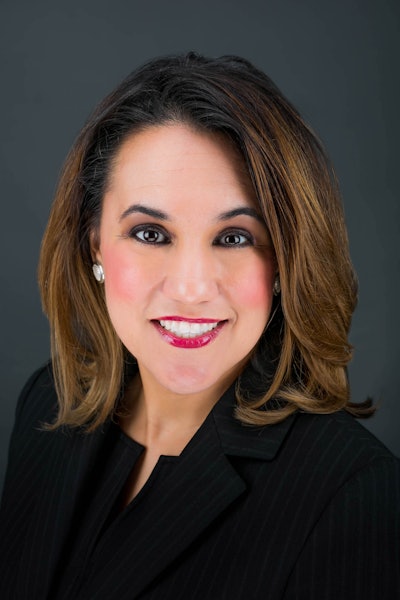Since March 2020, Dr. Linda Garcia has been investigating the effects of the COVID-19 pandemic on community college students. Garcia is the executive director of the Center for Community College Student Engagement (CCSSE), and she noticed that, although the pandemic has negatively affected all students, Black students have been impacted the most.
 Dr. Linda García
Dr. Linda GarcíaGarcia and the National Alliance of Community and Technical Colleges pulled together a panel of education leaders who have been making institutional changes in an effort to keep Black students, in particular, Black men, enrolled in higher education. The panel urged institutions to listen to their students, increase connections and pathways between K-12 and post-secondary education, and provide mentors to engage with and nurture Black male students through their education, both on and off campus.
During the pandemic Black students overall had more difficulty accessing technology, Garcia said. Those that did have a laptop or smart phone often had to share that device with another family member. Many struggled to have enough food on the table for themselves or their family.
Dr. Donald “Guy” Generals, president of the Community College of Philadelphia (CCP), said the struggles that Blacks students face tend to be in three areas: financial, preparedness, and community support.
 Dr. Donald “Guy” Generals
Dr. Donald “Guy” GeneralsFinancially, many Black students are unable to meet their basic needs, like housing or food securities, said Generals. They come to college at differing levels of preparedness, and sometimes they arrive from a community that was turned upside down by COVID-19.
“[Student’s] parents, neighbors, whatever support that was there prior, if it’s been completely disrupted by pandemic, you can imagine what that’s done,” he said.
CCP partnered with the School District of Philadelphia to advocate for a “K-16 mentality,” said Dr. William Hite Jr., superintendent of Philadelphia’s public schools. Hite categorized his 57 high schools in three ways: on-track, near-track, and off-track, basing those labels on student performance on state assessment exams. According to the numbers, there are only seven high schools “on-track;” those seven are majority white.
“The pandemic disproportionately impacted those off-track and near-track schools more than those on-track. On-track schools had organizations and school support groups,” said Hite, referring to behavioral health training, medication, or meals for students. “Near-track may have had [those resources,] but off-track didn’t have them if the district didn’t supply it.”
During the pandemic, “we had to provide a lot of resources for young people to create the circumstances and conditions to be educated in a pandemic,” Hite added. Those resources included tech gear like computers, reliable internet, mobile devices. It also included health services.
“We have distributed ten million meals to young people, and behavioral health for those students impacted by trauma,” said Hite, specifically referring to gun violence in Philadelphia.
 Derrick Perkins
Derrick PerkinsDerrick Perkins, project director at the Center for Male Engagement at CCP, said that in order for institutions to address inequity, they must be student-centered.
“Too often, we try to decide what is in the best interest of our students, and then wonder why it doesn’t meet their needs. So, [at the Center], we talk to them, ask them what they need to be successful.”
He added: “We don’t ask students why you aren’t here, but rather, what aren’t we doing as an institution to make it safe for you to be here?,” said Perkins. “A student needs to know we care about them and what that care actually looks like in practice.”
The Center for Male Engagement offers all students a “support coach,” someone from the institution paired with them through intrapersonal exercises that assess compatibility. Those coaches become mentors for the students, available day or night, to answer questions and help the students through trying times.
Perkins said that it’s important for institutions to not just provide tutoring but to also teach students how to be tutored. “Make sure students have clear understanding of what their major is, career goals, so their work is meaningful,” he said. “We want our students to see themselves as leaders.”
Hillsborough Community College (HCC) in Tampa, Florida, has about 47,000 students. Black students make up about 19% of their student population, Black males 6%. Those numbers dropped dramatically during the pandemic.
 Dr. Kenneth Ray
Dr. Kenneth Ray“Over the summer of 2020, our loss in population of Black males was -14%, fall was -20%, and spring 2021 was down by 16%. So, we’ve been doubling our efforts in retention to attract first generation students, with a focus on Black males,” said Dr. Kenneth Ray, vice president for student services and enrollment.
HCC is working to connect its public school system to their post-secondary education. They partnered with the local school district and have academic advisors at high schools actively encouraging enrollment.
“We have seen a tremendous rise in applications, FAFSA form completion, and more students enroll from that program,” said Ray.
HCC signed a transfer agreement with the state’s four-year institutions, the University of South Florida and Florida A&M University, creating a guaranteed path to admittance. HCC also partnered with Black churches to get pastors involved in the movement toward higher education.
Hite, Generals, and Perkins all agreed that institutions should look at the supports already in place to see what is successful and what needs a change.
“Everyone at an institution is responsible for the feeling of belonging,” said Perkins. “Racism exists at any institution; it’s embedded in all of them. And because of that, we know if we’re not holding ourselves accountable, we just replicate those systems of oppression.”
Liann Herder can be reached at [email protected].















